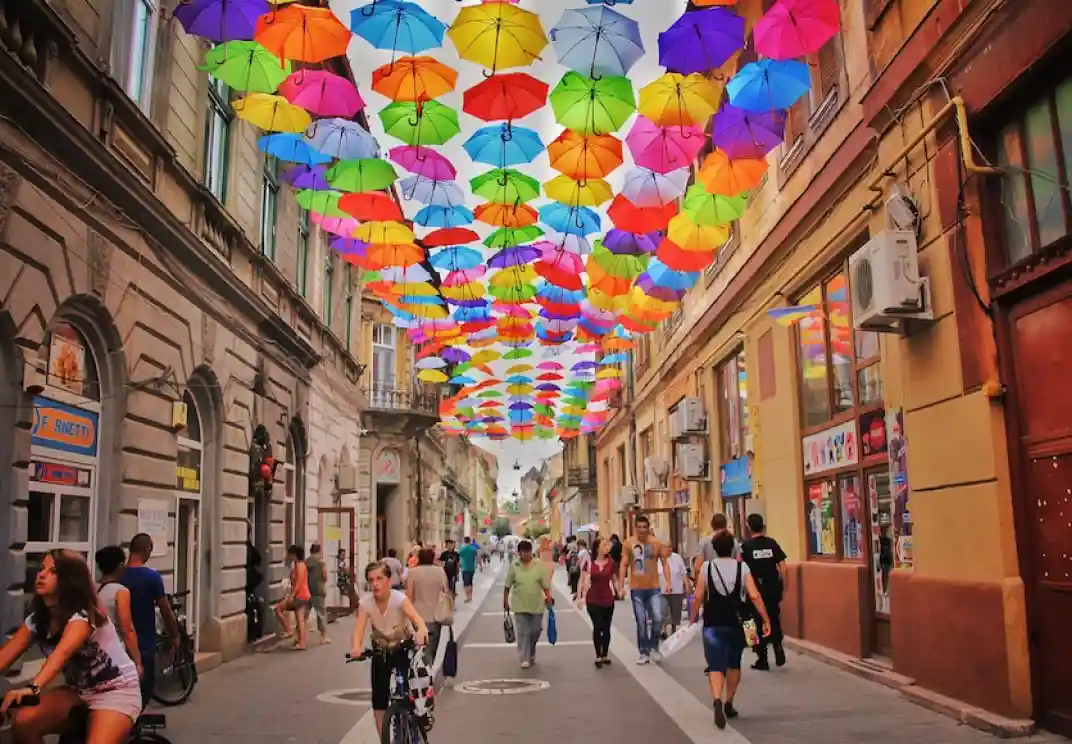It's no secret that the tourism industry has a negative environmental impact. From airplanes spewing greenhouse gases into the atmosphere to all the plastic waste created by tourists, it's clear that we need to find a way to travel more responsibly.
In this blog post, we will discuss what responsible tourism is and why it is important. We will also share the top 9 best practices on how to reduce your environmental impact when traveling. Let's get started!
What is responsible tourism?
Responsible tourism is the single best way to ensure that your vacation isn’t just an escape from reality — it’s also a way for you to explore, engage and experience the culture of a destination. However, it's not just a question of leaving your garbage somewhere else - it's so much more than that.

Responsible travelers recognize their responsibility to interact with local communities and the environment in a respectful way that adds environmental, social and economic benefits. It includes everything from checking that accommodations are health and safety checked to being extra mindful around wildlife.
If there's an opportunity to positively impact where you're visiting while fostering mutual respect between the visitor and host, then it can be classed as responsible tourism! Plus, who doesn't want the bonus of making the most of their holiday experience?
Travel can be fun while still being mindful of the impact it has on our planet- just stay lowkey responsible.
Responsible tourism vs. sustainable travel vs. ecotourism – is there a difference?
Responsible, sustainable, and ecotourism - what are the differences between these travelers' approaches?
To begin with, responsible tourism recognizes the importance of visiting locations in ways that respect locals’ culture and traditions. It involves understanding how your trip choices directly affect other local people, as well as playing a role in minimizing the negative environmental and social impact.

Sustainable travel, on the other hand, emphasizes meeting travelers' needs while preserving indigenous communities and protecting nature. This can involve looking at different methods of transport that are less damaging to the environment or deciding to stay in local guesthouses rather than larger complexes.
Last but not least, ecotourism is defined as traveling to natural and undisturbed destinations to enjoy the beauty of nature while still protecting it. Ecotourists should be extra mindful about bringing only what they need into areas affected by human activities, making sure not to leave anything behind.
Ultimately, all forms of responsible travel attempt to create memorable experiences for both the traveler and host community - with a focus on leaving them better off than before!
5 Reasons Why Traveling Responsibly Matters
Local communities benefit from responsible travel
You see, when you commit to responsible travel practices, you are taking an active role in helping those around you. Responsible travelers take the time to consider their impact before they act, which results in mutually beneficial outcomes for the traveler and local community members alike.

From supporting businesses like small family-owned hotels and restaurants to engaging with local businesses, responsible travelers are conscious of ways that their actions can make a positive impact during and after their stay – leaving only souvenirs and memories behind!
In this way, responsible travel helps forge strong lifelong bonds between the traveler and those who host them. As such, by committing to being a responsible traveler you are actively creating real change in your travels. Ultimately, it reverberates into the lives of many people throughout the world.
Taking a responsible approach to travel helps preserve natural and cultural heritage
Sustainable tourism can be so much more than just bringing your own refillable water bottle!
While exploring the world should be an exciting adventure, it is important to remember that it can have quite a big impact on local culture and history. Taking a responsible approach to travel is essential for preserving natural heritage.

Being conscious of our presence and respecting the customs of our host community also helps us preserve such precious sites from irreparable damage.
That includes both tangible experiences like historic buildings and monuments, as well as intangible experiences such as shared traditions and customs. Even something as seemingly small as being mindful about taking photos in sacred places, or supporting businesses owned by locals can go a long way towards protecting the heritage for generations to come.
Responsible tour operators' programs provide jobs for locals
The fourth reason why responsible travel is important is something you might not have thought of. Responsible travel programs provide jobs for locals.

Imagine the sense of pride your staycation in a foreign country could give someone who was able to be employed thanks to your vacation! These programs are such an invaluable way to help out the economy and livelihood of locals, all while still getting a unique and unforgettable experience.
There's no denying the positive impact responsible travel can have on a community, so make sure you check out those certified businesses that ensure economic prosperity during your travels.
Travel is made more enjoyable through responsible travel
By being a conscious travelers, going local, and abiding by basic environmental rules such as not leaving behind litter or disturbing wildlife, we can actually make our trips more enjoyable in many ways.
Not only will it give us peace of mind that we haven't disturbed anything precious or harmed any endangered species, but, quite honestly, it adds to the feeling of adventure.
Walking through nature with respect for its delicate balance gives us an appreciation for the area we are exploring, so why not take advantage of this sentiment? Responsible travel is the best way to get up close and personal with your destination - plus help ensure its long-term safety - making it something worth investing in both socially and economically!
9 Best Practices for Responsible Tourism
Stay in green travel hotels and use eco-friendly travel companies
When planning your vacation, the best way to get into responsible travel is by choosing eco-friendly travel companies, tour operators, and lodging!

From solar panels to green energy sources, opting for eco-friendly accommodation not only helps preserve nature but also provides a more environmentally conscious comfort.
And when using local guides or sustainable travel companies, make sure they’re taking sustainable approaches and renewable energy while showing you the sights—like using public transport or pedal power over gas-guzzling vehicles. It may be a little bit of extra work, but it makes a big impact!
Utilize environmental resources efficiently
It’s easy to get caught up in the excitement of traveling, but remember to stay mindful of your energy and water usage when abroad.

Remember to turn off lights and electronic devices when you leave a room, skip straws in local restaurants and bars, opt for hand washing clothes over using the tumble dryer, and take showers instead of baths.
It may seem like small steps, but it all adds up! Think of it as our way to give something back to Mother Nature.
Refrain from buying souvenirs made from endangered species
If you're looking for the perfect souvenir from your trip, let's make one thing clear: it should not be made with wildlife-endangered species.
We get it - nature's beauty can be too tempting to pass up! It may be tempting to pick up those cute souvenirs, but when traveling responsibly, refrain from buying anything made of animal skin or other body parts.

Refrain from buying souvenirs that have been made from endangered species - souvenirs like elephant ivory, tortoiseshell, and coral - because when you do, it actually hurts the animals in the long run.
While these items can make beautiful gifts, they’re often sourced through unethical practices that negatively impact animals and their habitats, which is the opposite of responsible travel.
Reduce your carbon footprint
With the alarming state of climate change and its ever-increasing effects on the planet, it’s important to consider each action you take and identify ways to reduce your overall carbon dioxide footprint. Reducing your carbon emissions includes:
- traveling with more eco-friendly methods for sustainability
- reducing waste throughout your trip by carrying reusable containers
- saying no to single use plastics
- organizing local tours that focus on sustainability initiatives
- and eating at establishments that make use of locally sourced ingredients.
Being a responsible tourist can help us all make a huge impact on the good of our planet.
Whenever possible, use public transportation or bicycles
If it ain't broke, don't fix it! That should be the motto when planning a responsible holiday. Don't just grab a car and clog up our beautiful streets with pollution - reach for an eco-friendly option instead!

While hopping on public transport or trading four wheels in for two can have its own challenges, it is one of the best practices to reduce carbon emissions. Not only are you contributing to reducing your personal carbon footprint, but you can also get a real feel for the culture of the place you're visiting.
Bicycle trips may take longer than driving, but what's wrong with taking some time to relax and enjoy yourself? Hop onto public transportation for an easy way to save money and give Mother Nature the love she deserves! Remember, there's no Planet B.
Support locally-owned businesses and vendors
From local eateries to boutique shops, support the small businesses in whatever city you’re visiting.
Whether it's perusing the quaint knick-knack shops around town, dining at a family restaurant, or splurging on a handcrafted souvenir, shopping locally ensures money stays in the community and goes back into keeping up the local culture and traditions.

So while you're out jet-setting around the globe, drop a few bucks at some of those charming little mom-and-pop stores to show your tourist responsibilities are top-notch.
The money you spend at these businesses goes back into the community and helps keep the economy alive - something that isn't always possible when visiting big-name restaurants and stores.
Plus, you get a more authentic experience by doing so!
Embrace local cuisine
For all the intrepid travel people out there, one of the joys of exploring a new destination is discovering unique and culturally significant cuisine. Not only does it tantalize our taste buds but it also allows us to gain greater insight into people’s lives, habits, and customs. One of the most important practices when traveling responsibly is to embrace local cuisine.

Try dishes from street stalls as well as high-end restaurants, purchase handmade delicacies from markets, eat with locals and be sure to educate yourself on respectful local dining etiquette.
You’ll not only save money, and discover hidden gems but you’ll also be supporting a more sustainable travel industry that cares for both communities and their environment. Bottom line? Let your taste buds explore as much as your adventurous spirit!
Respect local cultures and customs
When in Rome...or any other part of the world, for that matter - respect local cultures and practices. This includes dressing appropriately, being mindful of religious customs, avoiding taking photos without permission, and leaving nothing behind but your footprints.

Before setting out on any trip, it’s important to do your homework and research the destination you’ll be visiting.
This includes finding out about the area's endangered species, conserved areas, protected sites, cultural norms, and habits - all of which will help you make the most of your trip while also preserving its beauty and culture.
Explore local parks and destinations
It’s important to balance the sightseeing of key tourist attractions with visits to local parks and less-known destinations. Not only is this a great way to get away from the hustle and bustle, but you also get to enjoy nature in its most pristine form.
Plus, it’s often much cheaper! Think about it - what could possibly be a better way to get a glimpse into the rich culture of any destination than to explore its local parks and natural resources?

Taking a slow travel through local parks is one of the most underrated tourist activities, yet it provides an exceptional opportunity for travelers to soak up the vibes and experiences that make each destination so unique. Plus, this kind of exploration is one of the best ways to support local businesses rather than big chains or corporate tourist operations.
Not only are you guaranteed to have a truly enriched experience but playing your part as a responsible tourist in promoting sustainable ventures will do wonders in contributing towards economic growth in impacted regions.
Final Takeaways
Responsible travel is about more than just making sure your travel habits are sustainable. It’s also about being considerate and respectful of the people, places, customs, cultures, and environments you visit along the way.
When it comes to traveling responsibly and making a positive impact in any destination, remember these 10 best practices. Then, you can make sure that our trips not only enrich us with new experiences but also help stimulate the local economy, promote a greener and more sustainable environment, and protect the culture of places you visit.
So go forth and explore with confidence - just remember to leave nothing behind but your footprints!





